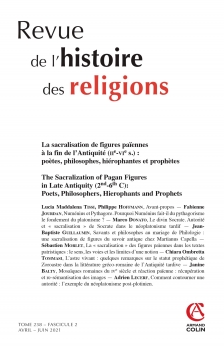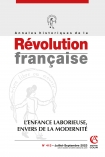
REVUE DE L'HISTOIRE DES RELIGIONS (2/2021)
Pour acheter ce numéro, contactez-nous
Recevez les numéros de l'année en cours et accédez à l'intégralité des articles en ligne.
Les historiens de la philosophie hésitent souvent sur l’école philosophique à laquelle rattacher Numénius. Tantôt il est considéré comme pythagoricien, tantôt comme platonicien. Michael Frede semble trancher le débat en le qualifiant de « platonicien pythagorisant ». L’article aborde la question en examinant la manière dont Numénius sacralise Pythagore. Il découvre la dimension polémique de sa démarche. Pour parvenir à un platonisme un et authentique, Numénius situe Pythagore à son origine, fait de Socrate et Platon ses disciples, et exclut de cette lignée tout ce qui s’éloigne de sa lecture de Platon. Ainsi s’oppose-t- il à ceux qui procèdent par inclusion pour reconstruire l’unité de l’Académie. Si, d’un point de vue historiographique, il est sans conteste platonicien, il s’estime sans doute lui-même pythagoricien.
Historians of philosophy often hesitate to assign Numenius to any one particular philosophical school. He is sometimes considered a Pythagorist, sometime a Platonist. Michael Frede seems to put an end to the controversy by calling him a “Pythagoreanising Platonist”. The paper deals with the question by examining the way in which Numenius sacralises Pythagoras and the polemical dimension of this sacralisation. To reach a Platonism that is really one and authentic, Numenius places Pythagoras at its origin, portrays Plato and even Socrates as his pupils, and excludes from this line of thought all that is foreign to his interpretation of Plato. In this way, he is in conflict with those who, on the contrary, have recourse to inclusion in order to reconstruct the unity of the Academy and thus accept other trends within it. If, from an historiographical point of view, Numenius is indisputably a Platonist, he probably saw himself as a Pythagorist.

